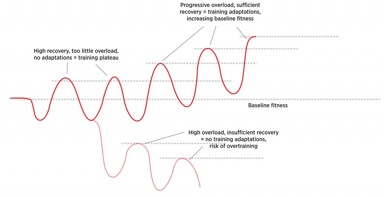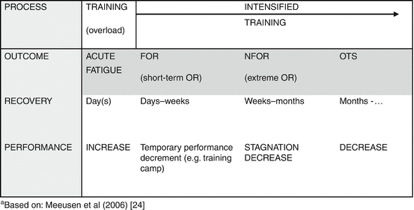Undergraduate perspective on Sports & Exercise Medicine – a BJSM blog series
By Rachel Cooke & Lysander Gourbault (@lgourbault)
After setting up Durham Sport and Exercise Medicine Society (DSEMS) at Durham University for 2013/14 our enthusiasm for the speciality has grown after each event we’ve hosted. So when we walked into Manchester Conference Centre we were extremely excited to be at our first BASEM event and ready to engage in the talks about Overtraining Syndrome (OTS) from some of the top experts in the country. For those students that were unable to attend, we thought we should share our highlights from the conference.
Dr John Rodgers kicked off the day with a quote from TS Elliott: “Only those who risk going too far can possibly find out how far one can go.” It is this desire to push the boundaries to be the best which underpins the risk that is OTS. Athletes overload their bodies in order to adapt and improve performance (See Graph 1), however, pushing too hard risks decreasing overall performance. Dr Rodgers finished with ‘the quote of the day’ – “In order for an athlete to perform remember the 4 H’s; the athlete must be Happy, Healthy, Hungry and most importantly Horny!”

Tom Lancashire, Team GB 1500m Olympian, then stepped up to give an athlete’s perspective on his support team – “The athlete should be at the centre of everything”. With this ethos in mind, clear communication between members of his team as well as individualising his training plans is vital for him to be successful. Not only is this essential for Tom, but for all sports professionals in all disciplines.
The impressively published Professor Romain Meeusen, described the spectrum of post-training fatigue that exists (table 1) and the importance of maintaining the athlete’s work / recovery balance. Key to avoiding overtraining is monitoring – Heart Rate Variability for acute fatigue and Profile of Mood States for readiness to train were highlighted as useful tools.

Professor Newton then presented a whistle-stop tour of Chronic Fatigue Syndrome (CFS) – CFS has a prevalence of 0.2-0.4% and subsequently clinicians are typically underexposed to this syndrome and lack confidence managing it. The Graded Exercise Therapy (GET) by NICE was presented as a possible treatment algorithm but with varied results. Her research has shown at least 2 different muscle phenotypes exist in people with CFS, which may explain why some people responded better to GET. How long then until pharmacogenetics becomes everyday practice?
Dr Bolaert, Consultant Endocrinologist, then moved onto hypothyroidism. To treat or not to treat? Like many hormones in the body TSH shows a normal distribution within the population, with a positive displacement observed with increasing age just to complicate things! The current limit for treating stands at TSH levels of 5µIU/mL, however, Dr Bolaert feels that 4.5 may be more suitable.
Sports nutritionist for the English Institute of Sport, Nathan Lewis, then stepped up to give food lovers some good news. Eating more carbs will help you lose weight! Apparently a 2 week restriction of these key foods led to increase inflammation in athletes as seen by increased TNF post-exercise and increased lipid peroxidation.
Nathan Lewis’s colleague at ORRECO, Dr Charles Pedlar, then bamboozled our undergraduate brains with some detailed physiology. Important points mentioned were the disruption that altitude can have on sleep as well as hormesis. This means that you can get a favourable response to low exposure toxins (which at high levels would cause harm) I.e. What doesn’t kill you makes you stronger!
Lunch gave us a chance to prepare for the most entertaining talk of the day by ex-Royal Marine Professor Dave Collins. Don’t forget the BIOPSYCHOSOCIAL model of health! Clinicians sometimes forget to look at the person as a whole but the psychosocial aspects to performance are just as crucial to success. Monitoring athletes must therefore include mental state questionnaires which should be tailored to the individual.
Dr Leeder detailed OTS from the British Cycling team point of view. These elite athletes are so closely monitored that overtraining is thankfully a rare occurrence as training is measured to hundredths of a second. This means that they know immediately when they start to underperform without a need for bio-testing or any other fancy tests. Again team work and taking control of your success were the key ideas in Dr Leeder’s talk.
Dr Tony Strudwick delivered the final presentation on Manchester United’s view of OTS. Recovery is a significant issue for the boys in red especially around Christmas when they will often be playing 3 games in the space of 7 days. This intensified period of play invariably leads to a significant increase in the number of injuries. So what have they been doing to try and stop this? Intensive and extensive measurements of athletic performance have led to them developing a Red Flag System which has shown to be a good predictor of the likelihood of a player getting injured.
A fantastic day of learning came to an end with some key messages to take away with us and back north to Durham. Firstly, everything is about the team and everything the team does is for the athlete. Monitor anything and everything; make sure this is done holistically and includes all components of the biopsychosocial model of health. And never, ever forget the 4 H’s!
*****************************************************
Lysander Gourbault is a third year medical student at Newcastle University. He is the joint founder of Durham Sport and Exercise Medicine Society (DSEMS) and has a passion for sports medicine and orthopaedics. You can contact me on Twitter @Lgourbault. Find out more about DSEMS @DSEMS1, on our facebook page or by contacting durhamsems1@gmail.com
Rachel Cooke is a second year medical student at Durham University, John Snow College. She is a student ambassador for Durham University and is the joint founder of Durham Sport and Exercise Medicine Society (DSEMS) at Durham University.
Dr. Liam West BSc (Hons) MBBCh (@Liam_West) is a graduate of Cardiff Medical School and now works as a junior doctor at the John Radcliffe Hospital, Oxford. In addition to his role as an associate editor for BJSM he also coordinates the “Undergraduate Perspective on Sports & Exercise Medicine” Blog Series.
If you would like to contribute to the “Undergraduate Perspective on Sports & Exercise Medicine” Blog Series please email LIAMWESTSEM@HOTMAIL.CO.UK for further information.